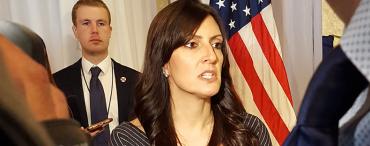
Certainly for the past four decades Cuban-Americans from Florida have flexed impressive political muscle. But today is different. Today we've reached a time and a place where no state in the country, at any point in history, has had more Cuban-American leaders in top political positions at home and in Washington than Florida has right now.
It's worth some reflection.
At Monday morning's inaugural week breakfast, Women Transforming Florida at the Goodwood Museum, Jeanette Nuñez was announced to a cheering crowd and a standing ovation as the first Cuban American woman to be elected lieutenant governor in Florida, in fact the highest ranking Hispanic woman in state history.
Nuñez said she thought long and hard whether to take the step to run. She was going to give politics a break. "It seems like my plans have changed," said Nuñez, 46. "I couldn't have been more proud to stand alongside (Gov.-elect Ron DeSantis) and tour our extraordinary state. ...
 “I’m inspired to pave the way and encourage young girls and women of all ages in all walks of life to follow their dreams. It’s taken a lot of work. It’s taken a lot of sacrifice, but most importantly, it’s taken a lot of faith."
“I’m inspired to pave the way and encourage young girls and women of all ages in all walks of life to follow their dreams. It’s taken a lot of work. It’s taken a lot of sacrifice, but most importantly, it’s taken a lot of faith."
Nuñez joins other Cuban-American leaders in Florida leadership roles -- in particular, José Oliva of Miami Lakes, the 101st speaker of the House.
Oliva graduated from Hialeah-Miami Lakes High School, and later attended St. Thomas University, but did not graduate. He began working for his family's cigar manufacturing business, and eventually served as its chief executive officer. From 2001 to 2005, he was a Hialeah housing commissioner.
Another Cuban-American, Carlos Lopez-Cantera of Miami, was having a benchmark day of his own. He was serving his last day as lieutenant governor. He has been the first Latino to hold the position. Had Gov. Rick Scott changed his mind, decided to resign in time to be sworn in with the rest of his Senate class, Lopez-Cantera would have been governor of Florida for five days.
And Marco Rubio, with the defeat of Bill Nelson, is now Florida's senior senator and one of the most powerful members of Congress.
True, Rubio's promotion doesn't make up for the loss of the venerable District 27 congresswoman Ileana Ros-Lehtinen, who did not seek re-election, or rising star Carlos Curbelo, who lost his District 26 House seat to Debbie Mucarsel-Powell.
But Ros-Lehtinen goes out as chairman emeritus of the House Committee on Foreign Affairs and chairman of the Subcommittee on the Middle East and North Africa, where she has continued to voice her strong support for the state of Israel and human rights, including her opposition to the dictatorial communist regime in Cuba. But both are Republicans. Had they remained, their committee assignments could have been adjusted downward under the new Democratic House leadership.
Ros-Lehtinen supported another Cuban-American to take her place, journalist Maria Elvira Salazar who handily won her GOP primary in August. Ros-Lehtinen was hopeful: For 29 years a Miami Cuban-American has never lost a House seat to a non-Cuban. But in November Salazar fell to Democrat Donna Shalala in what has become a Democratic district.
Meanwhile, Rubio is soaring. Not widely known is the Florida senator's powerful role in setting U.S. policy in Latin America, as chair of the Senate's Subcommittee on the Western Hemisphere. His influence in the Senate grows daily.
POLITICO reported Rubio has a close relationship with National Security Advisor John Bolton and Secretary of State Mike Pompeo, who successfully pushed for tougher Venezuela sanctions Rubio had been calling for -- "including penalties that target a Venezuelan official implicated in an assassination plot against the senator."
Rubio and another Florida Cuban-American, GOP Rep. Mario Diaz-Balart, "were architects of Trump’s policy to unwind President Barack Obama’s rapprochement with Cuba ..." POLITICO said.
Rubio also helps steer an influential body of President Trump's Cuban-American appointees from Florida on hard-line Latin-American issues, including Mauricio Claver-Carone, acting U.S. executive director at the International Monetary Fund and an attorney who rose to prominence in conservative foreign policy circles and advised Donald Trump’s presidential campaign; former state Rep. Carlos Trujillo of Miami, permanent ambassador of the United States to the Organization of American States; attorney Eliot Pedrosa of Miami, U.S. alternate executive director of the InterAmerican Development Bank; and former Miami mayor Tomas Regalado, head of Radio Marti.
It's no accident that Cuban-Americans have developed stronger political voices than most first and second-generation Americans. They vote more frequently than any other Latinos. Consider for a moment that only one non-Cuban has been elected mayor of Miami since 1985.
"Jeanette Nuñez is an exciting leader for our state," said Marion Makle, an attendee from Duval County at the breakfast. "No wonder the Cubans here are so proud of her. We all are."
Reach Nancy Smith at nsmith@sunshinestatenews.com or at 228-282-2423. Twitter: NancyLBSmith


